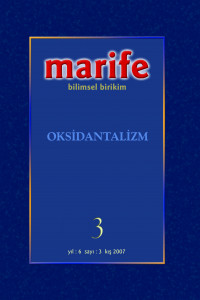THE CHALLENGE OF THE QUR'ÂN AGAINST OTHERING OR THE ADVENTURE OF THE TRANSITION FROM ONTOLOGICAL OTHERING TOWARDS ATTRIBUTIVE OTHERING
Abstract
With respect to human history in general, and history of religions in particular,
one may recognize two main historical lines: (a) cult-centric constructions
that cover the emotive, cognitive and practical modes of suspending (of the same
culture-civilisational milieux) and othering (of the different culture-civilisational basin)
or construct identity criteria based on ethnic, religious, physical, biological, geographical,
etc. variables; (b) wahy /”revelation”-centric constructions that comprise
of “word”/kalimah, praxes and ethos, positing all alterities as unfolding the
wisdom of creation, negating all types of ontological upper-lower stratification and
hierarchy, designing all humanity equal in relation to rights and freedoms and seeing
all as creational fraternities. Furthermore, a historical and theological situation
that may be named "metamorphose of the Ahl al-Kitâb" is an ethos as if a moral
pendulum swinging from the domain of wahy to that of cult pertaining especially to
power and authority relations. The Last Revelation, i.e. the Qur'ân, situates those
who impede to unfold the possibilities and potentialities of humanity in history, or
those who used to otherize human beings as "attributive others", namely, kuffâr
(“coverers” of truth, right, freedom), munâfıqs (“double-faced/character in faith”),
zâlims (“oppressors”), and the like in real history; but it never wishes to turn this
situation and its established quality into "ontological others/ings". That is to say,
the Last Revelation does not envision to transform its attributive others into ontological
others; revealingly, the divine plan of transferring the infidels of Tâif into
the helpers (ansâr) of Madinah is ever extent within divine economy. Today, humanity
hastily flowing towards the apocalyptical doomsday, Armageddon, needs a
world in which there are no "ontological others". And the theology of such a world
would be the Theology of Ta'âruf (mutual communication and wisdomizing).
Through this theology, to view and protect all alterities and differences among
humankind as colorful, stained glasses; and to realize an indispensable paradigm
that envisages not to oppress, nor get oppressed, nor make someone oppress
somebody by supporting those who are suspended and oppressed such as group,
class, culture, civilization, or religion via cultic praxes, ethos, and discourses, can
become possible.
İSLÂM’IN ÖTEKİLEŞTİRMEYE MEYDAN OKUMASI VEYA “ONTOLOJİK ÖTEKİ”DEN “VASIFSAL ÖTEKİ”NE İNTİKALİN MACERASI
Abstract
İnsanlık tarihi genelde, dinlerin tarihi özelde göz önünde tutulduğunda iki ana çizginin varlığı fark edilebilecektir: (a) Etnik, dinî, fizikî, biyolojik, coğrafî vb. bir takım unsurları belirleyenler olarak öne çıkarıp, bunlara göre kimlik "kıstaslar"ı inşa eden veya kısaca "öteleyen" (kendi kültür ve medeniyet havzasındakiler) ve "ötekileştiren" (farklı kültür ve medeniyetlerdekiler) duygu, düşünce ve davranış türünü kuşatan kült eksenli yapılanmalar, (b) tüm farklılıkları yaratılışın hikmet açılımları olarak konumlandıran, alt-üst varlık hiyerarşisini nakzeden, tüm insanlığı hak ve hürriyetlerde eşit, yaratılışta kardeş (halkî uhuvvet) olarak ısrarla dizayna çalışan söz, pratik ve hâleti ifade eden vahiy eksenli yapılanmalar. Ehl-i Kitaplaşma olarak tarif edilebilecek tarihsel ve teolojik durum da, ahlâkî sarkaç gibi bir yandan vahiyden esintiler taşıyan; ama güç ve hâkimiyet ilişkilerinde kült eksenli duruma raptolmuş bir hale karşılık gelir. Son Vahiy, insanlık fıtratının tarihte potansiyel dürümlerinden açılışına imkân vermeyen tüm ötekileştiricilerin yaptıklarını da "vasıfsal ötekiler"/küffâr, münafıklar, fâsıklar, zâlimler, vb. olarak reel tarihte oturtur; ama bu durumu ve oluşturduğu vasfı, ontolojik duruma tahvil etmez. Yani Son Vahiy; vasıfsal olarak kurduğu "ötekileri", hiç bir zaman "ontolojik öteki"ne dönüştürmeyi istemez; nitekim Tâiflilerin de belki bir gün Medineliler gibi ensârlaşma umudu ilâhî plânda her zaman mevcuttur. Vahiy ekseninin inşa etmek istediği "ontolojik ötekisiz" bir dünyaya, hızla Armageddon'a doğru akmakta olan insanlık muhtaç bugün. Bu dünyanın teolojisi de Te'âruf teolojisi olmalıdır. Bu teoloji ile, farklılıkları varlık âlemindeki renkli vitraylar gibi görüp, kollamak; kültlerin ısrarla ötelediği ve ötekileştirdiği grup, zümre, kültür, medeniyet veya dine arka çıkarak zulmetmemeyi, zulmettirmemeyi ve zulmedilmemeyi vazgeçilemez bir paradigma olarak gerçekleştirmek mümkün olacaktır
Details
| Other ID | JA35CJ75GE |
|---|---|
| Journal Section | Research Article |
| Authors | |
| Publication Date | December 31, 2006 |
| Published in Issue | Year 2006 Volume: 6 Issue: 3 |
This work is licensed under a Creative Commons Attribution-NonCommercial 4.0 International License.

